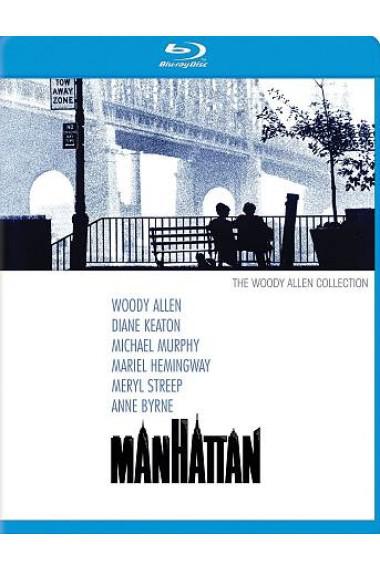Manhattan review by Jackass Tom
One thing I’ve never completely reconciled in the film Manhattan is how such a beautiful intro ties into the rest of the film. Allen opens the film with a montage of black and white shots of Manhattan, showing off its urban beauty with Gershwin’s Rhapsody in Blue setting the mood and the timing of transitions. This starts with Allens own narration to a novel his character is writing where he can’t decide how to tell a story about the city. Then he finally scraps it and allows Gershwin and Gordon Willis to take over completely. It’s so beautiful that it could stand on its own, or introduce any other film that is a love letter to section of New York that we all associate deepest with New York.
My problem was that what followed was a story about how Woody Allen’s character Isaac is caught between two women: one a literal school girl, Tracy (Muriel Hemmingway) and one a literary hipster, with a quick critical tongue Mary (Diane Keaton). What does the city (and the title of the film for that purpose) even have to do with this typical Woody Allen theme of infidelity?
The first time I saw the film it had only been the first or second Allen film I had seen. The best I can come up with is that the character of Mary was synonymous with Allen’s view of a Manhattan and the people who inhabit the city. A recent viewing of Annie Hall (a film Allen made two years before Manhattan) actually shed more light on this idea. Towards the end, as Annie and Alvy are calling it quits (again), Annie hits Alvy with this quote:
“You’re incapable of enjoying life. You are like New York City. You are an island all to yourself.”
In this moment, Annie likens New York City to not only an island but the inability to enjoy life. That brings us to Mary Wilke also played by Diane Keaton. In his first few meetings with her she offers the appeal of a literary contrarian. A hipster. She enjoys art, but is critical of many cultural classics. It seems anything Isaac brings up that he likes (Mahler, Bergman, etc) she has some prepared reason for why they are lacking despite public appeal. Her pseudo-intellectualism is what draws men like Isaac to her, but it is also part of her deep rooted unhappiness. She deals with conflicts of her relationships (goes back to Yale despite their relationship being a dead end), conflicts of her work (takes jobs she doesn’t like for the money), and conflicts within her intellectualism (admits to dating her professor at one point and feeling inferior to him). By the end of the film she is a self-acknowledged wreck of emotions and bad choices; not nearly as calculated and quick-with-the-answer as she was in the beginning.
And then there is the city. Allen and Gordon Willis show it off in stunning black and white. As mentioned previously the intro-montage is as impressive as any in film. These impressive shots are sprinkled into to one of Allen’s most visually stunning works, so there is atheistic love established for his city. It is big, and bold, and beautiful and smart. But it’s also New York; its not perfect it has issues. As much as its size makes it a great city, it also has problems. It has conflict and arrogance. It is sometimes too sophisticated for its own good and often relies on its sophistication in place of true emotion. At least that’s what we read in if Mary (ironically an outsider originally from Philadelphia) is to equal Manhattan; or at least someone who has given into the pressures of the big city and has been influenced by its culture.
And where does that leave Tracy? She is young, simple, and humble. She deals on emotions as opposed to intellect. She is unaffected by the city in the same way as Mary (so far). Isaac quickly dismisses her. He keeps her at an arm’s length and tells her over and over that she shouldn’t take him seriously (she will have “many men ahead of her”). Young Tracy doesn’t understand an argument when it’s her emotions that are at stake. After Isaac is then dumped by Mary, he runs back to Tracy. In the final moment she tells Isaac he has to wait six months. If they are truly in love it will work out.
…and that’s where the film ends with an extended shot on Isaac’s face that essentially says, “Good luck.” As Tracy, goes to school in London and becomes older Isaac fears she will likely grow closer and closer to a girl like Mary, losing her wonderful innocence, giving way to calculated coldness and intellect that gets in the way of being human. She will become more like his view of Manhattan.
Like Annie Hall this is a film that I enjoy more with each viewing. On Blu-Ray, Gordon Willis’ pictures look more beautiful than ever.








8 out of 10 Jackasses blog comments powered by Disqus
Search
Manhattan

IMDB Link: Manhattan
DVD Relase Date: 2012-01-24
DVD Aspect Ratio: 2.35:1
DVD Extras: None.